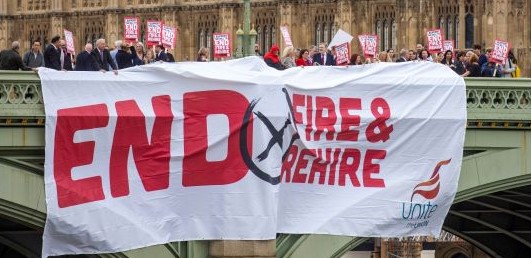Brexit battle
Labour will fight for a Brexit which delivers “strong relations” with the EU and preserves the UK’s ability to trade in goods and services with the continent.
In a major speech in London, Keir Starmer MP, the shadow secretary for leaving the European Union, said there was now a battle between competing visions of Brexit which would shape the future of this country.
In choosing the same stage, at Bloomberg HQ, where in 2013 David Cameron announced his intention to hold an EU referendum Starmer sought to make it clear that Labour intended to be front and centre in the fight for what shadow chancellor, John McDonnell MP, has described as “a people’s Brexit”.
Starmer criticised former Tory Prime Minister, David Cameron, for “putting short term political decisions ahead of the national interest” and overseeing “one of the greatest derelictions of duty of a British government in modern times”, in failing to plan for Brexit.
Cameron’s successor – Theresa May – was also in his sights. Mrs May had “set aside the national interest” and was serving only one side of the debate in “a double dereliction of duty.” Labour, in contract, would seek to speak for the whole country, and fight “hard Brexit”.
His vision was of exiting the EU but building what he called “strong relations with our EU partners based on the principles of co-operation, collaboration and mutual benefit. A future which preserves our ability to trade in goods and services with our biggest market.”
Economy and jobs
Starmer added that the UK could not be left “standing outside and shut off from the European market of 500m people who could buy our products and our services”, and there could be no “global race to the bottom which would not only put our economy and jobs at risk.”
The Brexit model Labour would pursue, he said, could be boiled down to one which “maintains and protects our ability to successfully to trade goods and deliver services with and to the EU.”
In essence this would mean a number of things – “continued tariff-free trade for UK businesses with the EU; a model that ensures that any new regulatory frameworks do not add bureaucratic burdens or risk harmful divergence from the EU market, a model that protects competitiveness of our services and manufacturing and a model that ensures that existing protections at work provided by the EU are maintained.”
The other major plank of the speech, reflecting the wider debate on what Brexit really shapes up like, was on immigration.
Starmer, who for a time was shadow immigration minister, said “no comprehensive approach to Brexit or response to the referendum result can ignore the issues of freedom of movement.”
Setting out his thinking he quoted Unite general secretary, Len McCluskey,  as recently saying, “there is no doubt that concerns about the impact of the free movement played a significant part in the referendum, particularly in working class communities…we are past the point where [this] can be ignored.”
Bold and ambitious
Labour now had to formulate what Starmer called a “bold and ambitious response” to this challenge. The thrust of it would be a new relationship with the EU “based on fair migration and reasonable management of migration.”
Pointedly he suggested that it would be a good thing if Brexit led the UK to confront “the appalling and enduring skills gap” while also dealing with “low pay exploitation.”
His overall approach may be best summed up as an argument for a progressive Brexit in the national interest with jobs, trade and living standards high on the agenda.
However, as Starmer pointed out, “the status quo is not an option.”
 Like
Like Follow
Follow


